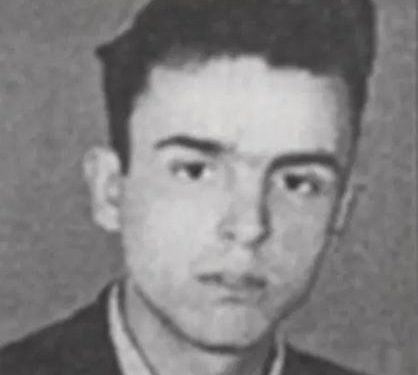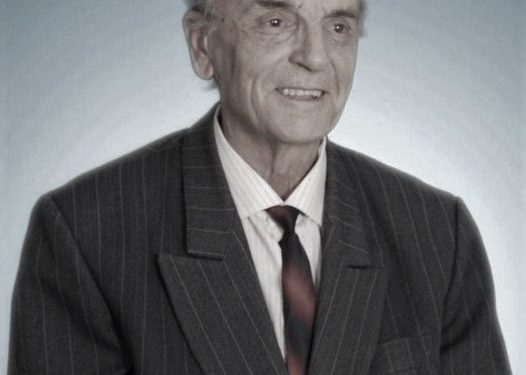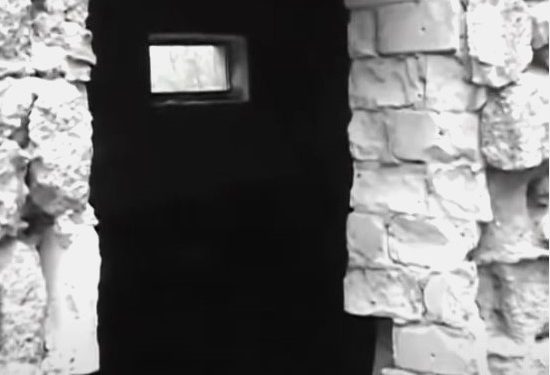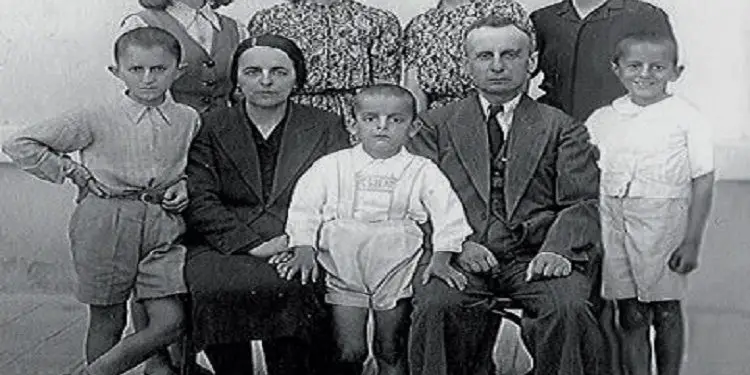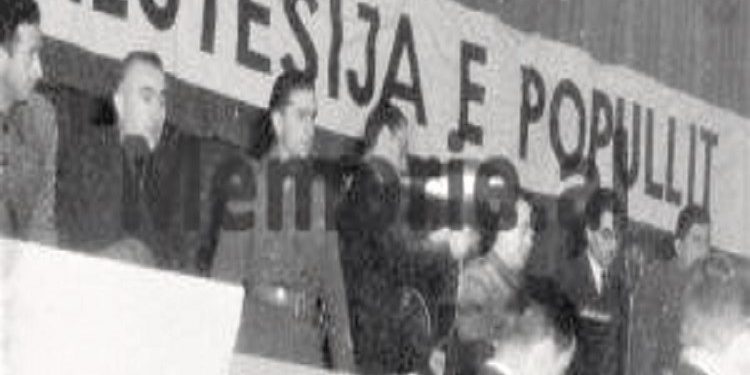By Reshat Kripa
The sixth part
Memorie.al / “Sometimes, when difficult trials fall on a child’s head from the tenderest age in the secret recesses of his soul, a kind of scale is born, a beautiful scale, with which he weighs the affairs of this world. Feeling himself innocent, he submitted to his fate without making a sound. I didn’t cry at all. He who has no reason to be scolded, does not scold others”!
(Viktor Hugo, “The Man Who Laughs”)
SHORTED YOUTH
Dedicated to family and society,
Author
Memoir
IN SECURITY CELLS
The cell where I was locked had dimensions of 2.5 X 1.5 and the height started from 20 cm. and ended at 1.5 meters. My head and my whole body hurt. I don’t know how long I was in that state, when I heard a voice calling, as if whispering:
– “Hey, who are you”?!
I had no strength to answer. I struggled but fell again. The call was repeated. I clung to the bars of the small window at the gate and struggled to get up. Next to my cell, under the landing of the stairs, there was another cell, which with mine was arranged in the shape of the letter “L”. In the window of her gate, I saw the face of a man.
– “Water”! – I said in a low voice
He tried to give me the little shot he had, but the irons wouldn’t take it, then he filled his oping and gave it to me. At first, I felt disgusted, drinking water, with the oping of a stranger. Did the sweat of his feet smell? But thirst forced me. I drank it at once. He refilled it and I drank that too. The water revived me. He filled it for the third time and said to me:
– “Wash the face”!
I washed. I felt the water bring me to life. At this time, a shiver came over me. Maybe I was getting a fever. He saw me, took a blanket and held it out to me through the window.
– “Take it and cover yourself, but be careful not to be seen by the guard.”
I took it and covered myself. After a while I fell asleep. I woke up to the sound of footsteps. I put the blanket to one side so it wouldn’t show. The keys to the gate jingled and a policeman appeared, speaking with a northern dialect mixed with southern.
– “I’m glad you came, my friend! – he spoke – “Get up and do your homework”!
I got up and went after him. We passed through a long corridor on either side of which were cells, each with a number at the top of the gate. At the end there were toilets and two taps. I finished work and he accompanied me to the cell…!
I went to the window and spoke to the neighbor. We started talking. It was Imer Rakipi, from Gjormi, the father of Neki Imer, former partisan commander, killed by them.
I sat in a corner and began to look at the cell. From the little light coming in from the window, I noticed some scratch marks on the walls. I reached over and read one:
“Gogo Zhupa was sent here”!
Who was this Gogo Zhupe, who was sent there?! During my time in prison, I did not meet anyone with this name. Those who knew him told me he was from Himara.
Next, another longer note:
Dear mother!… I’m sorry! I’m dying… with worry… because I’m leaving you alone… The criminals… have mutilated me… just like they did… even with my father…! I’m sorry, mother… that I… worried you…”!
PET…
He had not been able to finish the name. What did they call it? Petrit, Petrika, Petraq, Petref or, maybe Petro? What does death look like, he had not allowed his name to end?!
Reading these notes, I thought:
– “What do these cells look like, they are dying! What about me, will he be saved”?!
My mind went to school. That day was the draft. My classmates appeared before my eyes. Neri is among them. At that moment they were elaborating on the subject. And I was sent to that cell, from where I didn’t know if I would be able to get out alive. Could there be a more painful topic than the situation I was in? A sense of melancholy came over me!
It felt like I was looking at Neri’s face. This feeling added to my pain.
* * *
After three days, they allowed the family to bring my clothes. I returned the blanket to Imer, thanking him for the honor he had done me.
We had three internal guards. Captain Myfiti, was a real sadist. His satisfaction was when he saw the victims, mutilated by torture, being returned by the investigators.
He laughed out loud when he saw them in that state. It was a sarcastic laugh. – “How you were decorated with this red color”! – he said, writhing like a monster, when he saw the bloodied victims.
Corporal Vlashi was the policeman who took me out on the first day for personal needs. It wasn’t as bad as Myfiti, but it wanted to implement the requirements of the internal regulation one by one. The third was Sergeant Ghyshi, the husband of one of our neighbors, with whom we had family friendship. In general, he behaved well, especially with me who knew me.
Investigator, we had marshal Demir. A year ago, he was also Besnik’s investigator. It had created the conviction that we had to have a bigger one, which had pushed us down this path. He did not believe that three children like us would take such an initiative! We never managed to understand why his suspicion fell on a classmate of Besnik, Shefqet Dzhikun. He tortured us, to force us to admit that we were driven by him. But that was absurd. We had no choice but to accept. We were forced to endure torture.
One night I was sleeping in my cell. I felt a strong kick on my leg. I stood up shocked. In front of me, stood Captain Myfiti
– “Get up! – he said in a harsh voice – The executioner is waiting for you”.
– “The executioner? Which executioner”?! – I asked him.
He pursed his lips ironically and said:
– “You will see it when you go upstairs”.
He accompanied me to Demir’s office. He was writing something on the table.
– “Stay there”! – he said pointing to the corner of the wall.
I was silent. I had become extremely thin. I had no strength to stand. I leaned against the wall.
– “Don’t rely”! – he said in a commanding tone without taking his eyes off the papers in front of him. Above his head was a wall clock. It read one and a half. It was past midnight. As he finished his work, he stood up and addressed me:
– “Today I want to finish work quickly, because it was late. Tell me, where has he hidden your gold?!
I looked at him in surprise.
And where were my florins left, after all the vicissitudes we had removed. In our house, there were hardly any old clapboards left and no gold coins! Even if he had, he wouldn’t be so easily minded as to tell me, a fifteen-year-old? His question seemed to me like that of an uninformed beginner.
– “My father has no gold”, – I answered.
– “So, you’re not going to tell?” You also know the mouse holes that are in the house.”
– “I know those, but florins, my father doesn’t have them.”
– “Okay, break my neck!”
He tied my hands with irons and squeezed them tightly.
He laid me on the ground and began to hit me with both his palms as hard as he could. I watched his arms open violently and shoot at me. My little head was forced to endure his barbaric blows. He also started kicking me in the genitals. He put my foot with nailed shoes in his throat and rode on top of me, weighing me down with force…!
– “Hey, talk, where are the gold?”
The pains were excruciating. My nose started to bleed. This situation continued for almost two hours. I finally passed out. They threw a bucket of water on my face. I felt two hands that lifted me up and dragged me, slamming me into the cell.
I was in bracket mode. As if in a dream, different faces appeared before my eyes. Fatusha’s portrait appeared before my eyes, which gave me courage, but it was immediately replaced by Demir’s, which threatened me:
– “You are nothing but a corpse. You’re dead, you’re dead……”!
The vision disappeared and Neri’s portrait took its place. With an unheard sweetness, her voice whispered to me:
– “Love you! Love you”!
These visions overlapped with each other, from time to time. I felt tears begin to flow from my eyes. But I gathered myself quickly and said:
– “What are you doing? Be a man and don’t embarrass yourself”!
This state continued until the morning. I heard the gate open and Sergeant Grandfather who said:
– “Get up to take care of your personal needs”.
I couldn’t move. Hands bound with irons from behind hindered me. I told him. He lifted me up, untied my hands and walked me to the taps.
– “Clean up because it makes you feel better”, – he said in a soft voice.
I washed and removed the blood spots that had clotted on my face. The wrists were black from lack of blood circulation. When I finished, he escorted me to the cell. It didn’t hook me up anymore. As he closed the door, I said to him:
– “Thank you”!
He left without replying. I felt more relieved.
* * *
Nights passed amid the agony of torture. It had become common for quizzes to take place close to midnight. So, one night, I was taken as usual to investigator Demir’s office. He looked at me for a long time and finally asked me:
“Do you regret the activity developed”?
The question came to me unexpectedly. I didn’t know how to answer. I was thinking without answering.
– “So, what do you think”? – he continued.
I decided to tell him the truth:
– “Not at all”.
The answer came to him suddenly. He looked at me angrily and then said;
– “Like that?! Then make a statement about what you said”.
He gave me pen and paper. I started writing:
Statement
I, Reshat Kripa, from Vlora and a resident of Vlora, in the ‘Vrenez’ neighborhood, after being asked by the investigator that I am a participant and main element of the group with the nickname “Atdhetari” which consists of me, Myrteza Baboçit and Jorgo Besho, in that you are sorry for the crimes committed against the government, I answered you as follows:
I, Reshati, declare that the path I have followed by showing activity against the government, I call it right, as long as the situation in our country has not changed and that I expect this change from fugitives abroad, Anglo-Americans, etc.
I write and sign this statement myself, without being forced, because it is my deposition.
The prisoner declares
Rain Salt
Vlora, on 11-VIII-1951
Demiri took and read the statement. My face starts to take on all kinds of colors. He turned to me and with a criminal tone, said:
– “So, you wanted the Anglo-Americans”?!
– “Yes, Albanians and Anglo-Americans. They are our allies,” I answered.
– “Your allies, or yours”?!
He immediately started hitting me with his palms, fists and whatever he could. Then he called Myfiti and ordered him to tie my hands and take me to the cell.
* * *
One day the cell door opened and Corporal Vlashi said to me:
– “Take your clothes and come with me”!
I gathered the few clothes I had and followed him. When we got to cell number seven, he stood, opened the door and told me to go inside. It was a larger cell than the first. It had the dimensions 3 X 2 and a height of 3 meters. On one side of her lay a man in his thirties.
The other side was empty, I greeted my new friend and put the clothes in the empty place. I sat down and we started talking. He asked me where I was from and why I had been arrested. I told him. I knew him. He had grown olives in our factory. Then I asked him too. It was from Dukat. They called him Halo Çanaj. He was arrested, after he had sheltered some fugitives. He had been a soldier with the detachments of the “National Front”.
Halua mentioned to me the battles of Gjormi, Drashovica, Selenica and others.
He told me about the Albanian Thermopylae, the War of Grehoti with the Italians, where the commander Hysni Lepenica and thirty-five other men were killed. He told me about Skënder Muço and his two friends, who shot the Germans, just because they were nationalists.
– “Have you heard of any other battle, where the commander and thirty-five of his brave men have fallen”? – he told me proudly.
He spoke and I listened attentively. He also told me about the beginning of the fratricide, about the Dukat War, where the nationalist forces were treacherously attacked by the partisans:
– “It was the end of November 1943. It was past midnight when we woke up to the sound of gunfire. The dedication was given. We were treacherously attacked by two partisan battalions, “Asim Zeneli” and “Halim Xhelo”. The men of the village, under the command of Malik Koshena, grabbed their weapons and started to defend themselves. A bloody battle ensued. Twenty-three boys were killed, fourteen by partisans and nine by ballistic missiles.
The debate between the partisan Myrto Sadiku, from Tërbaçi, and the ballistician Murat Bodo, from Dukati, has remained a legend. Myrtua spoke first:
– “Throw down the gun, you dirty fascist”!
While Murat answers with verses:
“I’m not a fascist, but Dukat,
Not even you Russian, but Tërbac,
But we had taxis
That comes and kills us at the threshold”!
They were both shot fire for fire.
The Duchy mourned the fallen indiscriminately. He buried both parties, according to the Albanian custom. The mothers of the Duchy, the sons of Albania cried equally:
“Korba, our sons were killed,
Some here, some in the pack.
Some here, some at the party,
May you meditate, O Albania”!
Our commander, Malik Koshena, was shot by the communists last year. Halua was silent. The memory of that event shocked him greatly.
For the first time I heard a story different from what I had learned in school. I heard this from the mouth of a simple nationalist fighter, a man without school, but with a big heart. Halo’s simple storytelling, without pretense and with obvious sincerity, began to change my mind. about that period of history and those characters. who became her heroes?
* * *
After six and a half months. the Military Court of Durrës came. The trial was actually a farce. There were nine of us. that we were judged. The three of us, Halua, Imeri and four others, Bejo Vrazhdua from Bolena, Hajro Belishova from Mallakastra, Pullumb Llupa from Vlora and Pepo Koheni, a Vlonjat of Jewish origin.
Chairman of the trial, was the first captain Shuaip Shaze and members; lieutenant Namik Laze and a citizen of Vlora, Adile Selimi, wife of Qerim Selimi, whom I spoke about above and who worked at the Court of Vlora. The prosecutor was Gaqo Bezha, while the secretary was Raife Ismaili. The trial took place in two sessions, lasting no more than five hours. On the first day, the question session took place. Early the next day, the prosecutor’s claim was granted. This claim states, inter alia:
The three defendants together, at the “Ali Demi” gymnasium, participated in a hostile group, the so-called “Atdhetari”, created and baptized on the initiative of Reshat Kripa, against the people’s power. They held regular meetings, up to seven times in a row, in Jorgo Besho’s shop and elsewhere, these meetings were chaired by Reshat Kripa.
At the end of the meetings, decisions were made to increase the ranks of the group. They wrote a letter to Spiro Kokavesh, whom they invited as a member of the group, to sabotage the conferences that took place in the gymnasium, etc.
They, at the proposal of Reshat Kripa, have laid tracts. Myrteza Baboçi gave them their concepts. Reshat Kripa and Jorgo Besho took part in their writing, while in distribution, all three together!
Then there was the defense of the lawyers. Jorgua and I had a lawyer, Pavllo Sopiqoti, while Myrtezai, Petro Kisin. They tried to present the matter as a children’s fantasy…! Then the chairman took the floor, who asked for our last word.
– “I have nothing to say”, – I answered.
My friends gave the same answer. He expected us to ask for mercy. So, when he heard our word, he put his mouth on the gas. Then with the decision, number 111, dated 11.12.1951, they condemned us. The court decision states:
“As an element of the stratum affected by the reforms of popular power, the defendant Reshat Kripa, although at a young age, becomes established in the anti-power movement and as early as March 1951, he talks in turn with the other two defendants, Jorgo Beshon and Myrteza Baboçin.
They were shown defamatory propaganda from reactionary radio stations such as London and others, presented to them the change in the situation in our country and finally proposed to form a group called “Atdhetari”
The three defendants are consistent in their participation in an organized opposition group and in the compilation and distribution of leaflets with anti-government content”.
According to him, Myrtezana and I were sentenced to five years each, while Jorgon was sentenced to three years in prison.
The lawyers appealed to the Supreme Military Court. This court, with the Chairman, the first captain, Vangjel Kocani, and the first captains as members; Mustafa Qilimi and Mustafa Beqo, as well as the military prosecutor, captain Gazmend Yusufaj and the chief secretary, captain Murat Qazimi, on 17.01.1952, took decision number 35, which, among other things, states:
“The dangerousness of their activity is highlighted; therefore, the court’s decision is fair, both for the guilty declaration and for the amount of punishment, applied separately for each one”.
The decision read that of the Military Court of Durrës. /Memorie.al




